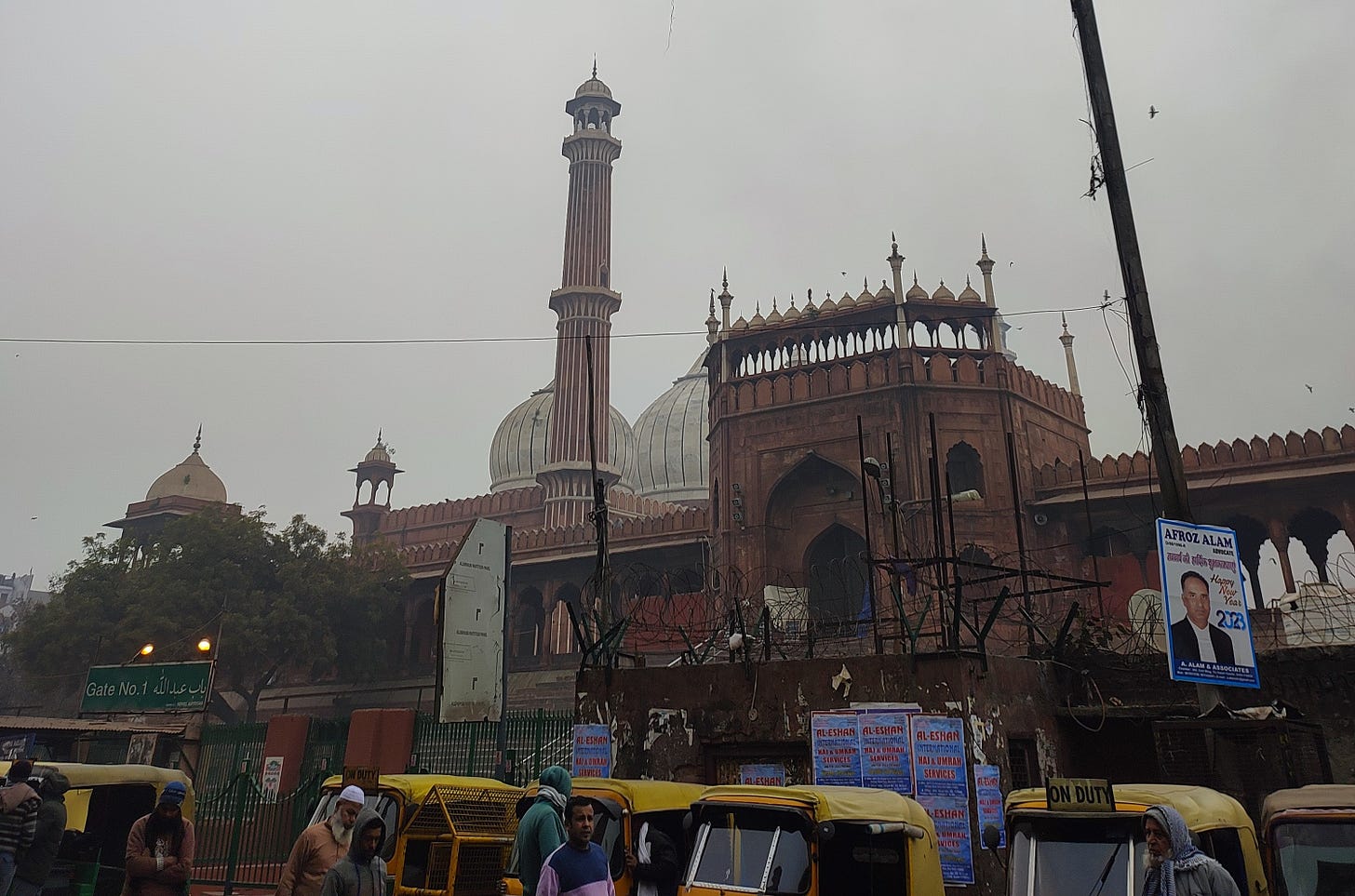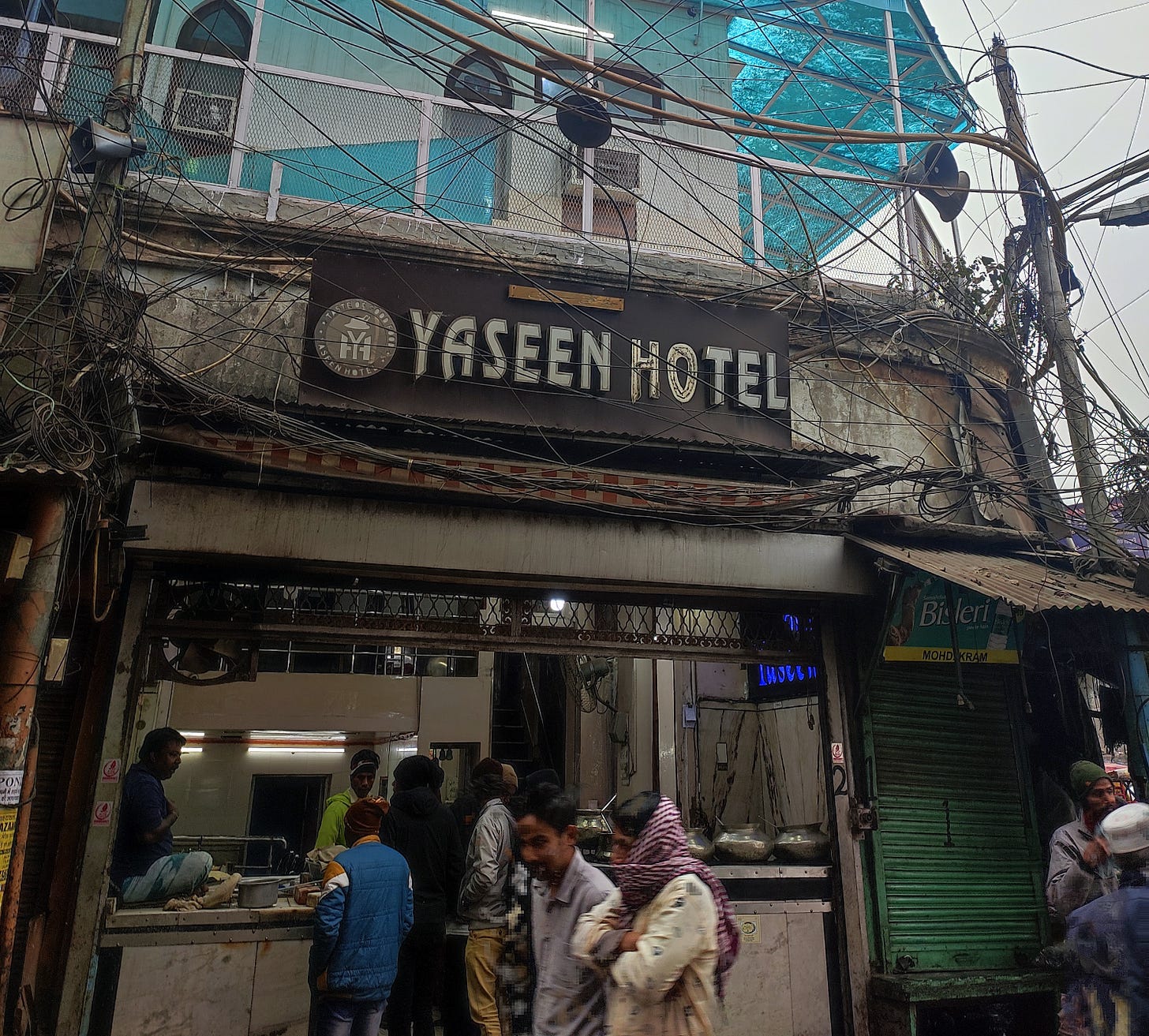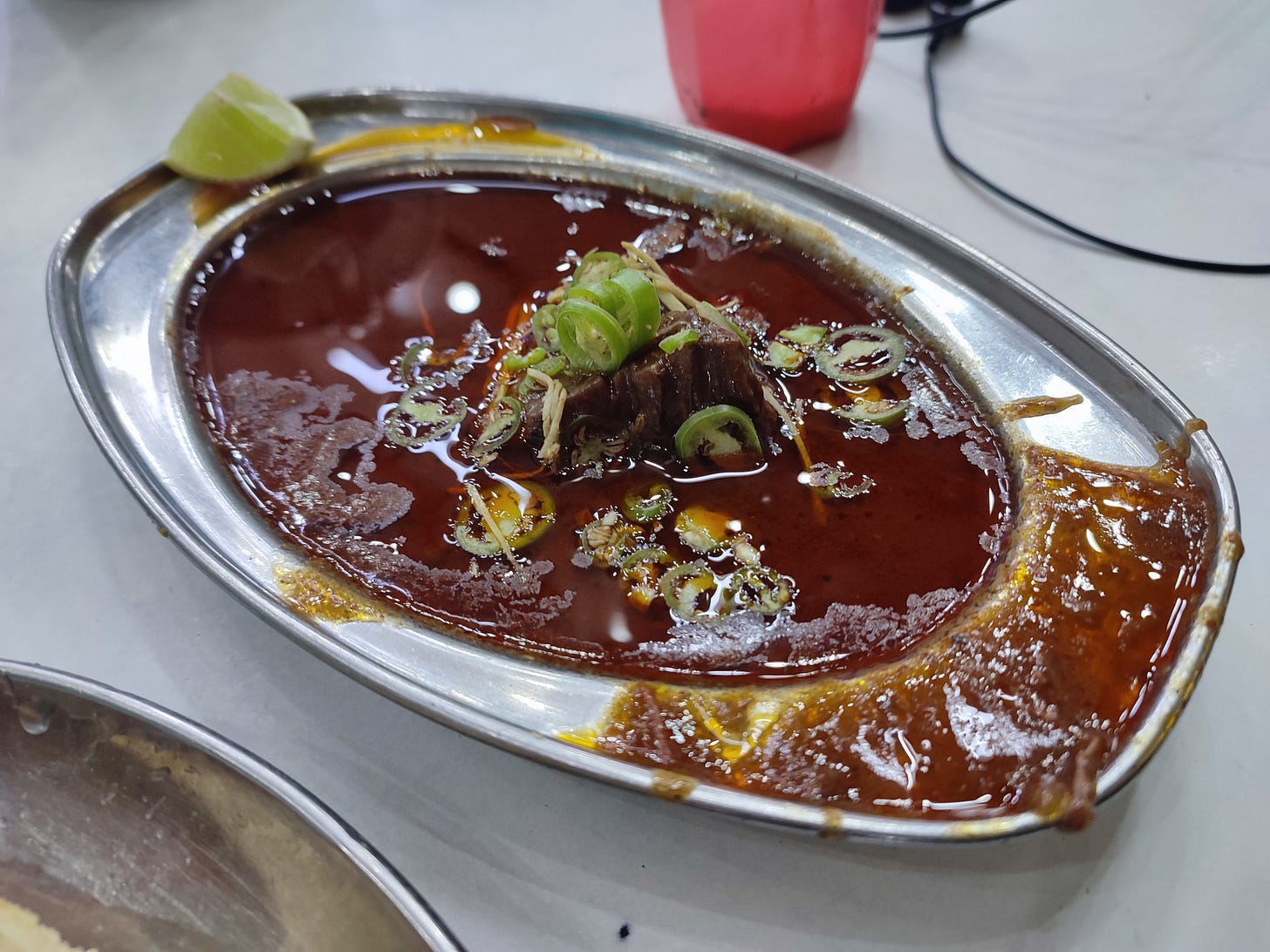Relishing an early-morning Nihari in the Delhi Winter at Yaseen in Matia Mahal
It is a foggy January Sunday morning in Dilli. You turn on your phone’s lock screen to see “06:24, 9°C” plastered over your wallpaper. You promptly place your device back into the pocket of your coat and put your gloves back on. Dilli is freezing. And you’ve found yourself in the middle of an avalanche. At this time, all you want to do is to be tucked beneath the covers of your weighted blanket, hugging a pillow while the heater in your room glows a bright red hue like the Eye of Sauron. Better to not think of that. Your destination is not far away. The auto ride feels like a dog sleigh through the Arctic Tundra, and the lack of visibility induced by the Great North Indian Smog sure helps accurately simulate that experience. Soon, you shall have arrived to your destination – the grand Jama Masjid in Old Dilli. In a couple of hours, the area in front of this grand structure will come alive with the hustle and bustle of what you’d expect from an Old Dilli marketplace, a sensory overload fuelled by the cacophony of kebab shops, ittar sellers and residents going about their daily business in the city’s narrow, ramshackle alleyways. After all, that is the Jama Masjid we are all familiar with, the Old Dilli that we are used to. But Old Dilli is an entirely different universe in the mornings. The sounds of noisy rickshaws and cycles are replaced by a quiet solitude, as the only shops open at this time are bakeries, tea stalls and some restaurants that serve breakfast.
One of these restaurants is your destination for today – Yaseen Hotel, at the corner of the lane that runs just opposite the Jama Masjid. You enter the shop and order a serving of Nihari with their Khameeri Rotis. Shortly after sitting, you are handed your plates – a steaming hot stew with chunks of meat floating like a tropical island surrounded by a sea of lava, two hot khameeri rotis, fresh from the tandoor, and some ginger and chillies for you to garnish on top. You break a piece of the roti and dip it into the stew. Parts of the potion stick to your bread almost immediately – this concoction has been simmering in a cauldron overnight, and is desperate to break free from its roots and enter a world where it can serve its purpose – of being satisfactory to human tastebuds. A bite of the roti is a canvas painted in Nihari Maroon, and your mouth lights up immediately. Another bite, this time with a piece of the meat, which is as fragile as a tower of Jenga in a game with your eight your old nephew, and the avalanche outside is a distant memory by now. A volcano explodes in your mouth with every bite, your body getting some much-needed warmth from the piping hot stew. The rich gravy of the Nihari, with a wonderfully imparted meaty flavour, one that is on the spicier side of the spectrum thanks to the overnight courtship of the meat, spices, chillies and ginger, coupled with juicy, tender chunks of meat that bring much-needed heterogeneity to this meal, to create the best breakfast in the world.
While Chhole-Bhatuure is a much more ubiquitous breakfast in Dilli, I prefer the city’s Nihari by a country mile, and so wish it were more readily available in the city outside Muslim ghettos in morning hours. It derives its name from the Arabic word “Nahaar”, meaning morning, owing to it being a spicy meat stew that is slow-cooked overnight, for over 6 to 8 hours, and served in the morning as breakfast after the Islamic fajr prayers that happen at dawn. There are many stories behind the origin of Nihari, but it is commonly believed that it originated in the medieval era both as a hearty meal for Mughal royalty to have after their fajr prayer, and as an energy booster for labourers working in construction sites.
With growing modernity and changing lifestyles, the Nihari is now relished at various times of the day, with restaurants serving it for lunch and dinner as well, due to it being rather unfeasible for corporate karamcharis to regularly wake up and jog out at 7 am for a spicy bowl of mutton stew. But the experience of battling Dilli’s arctic mornings to have this dish is a uniquely rewarding one. I’ve had better Niharis in the past, the neighbouring Hilal is my personal favourite, but this meal made me feel like I had to work for it, and that probably enhanced the flavour too.
Perhaps few seasons are more awaited than winter is in Dilli. The bone-chilling winds that arrive come November provide much-needed respite to the otherwise scorching heat of the Northern Plains. There is not a single Dilliwallah who does not have fond memories of the winter, whether it be frolicking around the medieval monuments of Lodhi Road hand in hand with a lover, or having a piping hot cup of chai on a chilly evening stroll at Connaught Place. Some enjoy the blooming of the Kachnar trees, and others relish the cold by taking auto rides late at night. Winter in Dilli is an emotion like no other, one that only those who have stayed in Dilli are capable of understanding. It is quite unfortunate that over the past decade or so, winters in Dilli have turned into a death trap. Pollution spikes in the colder months have made the city unbreathable, and the lack of political will by any front to solve the issue might mean that the best of Dilli winter is behind us, relegated to the pages of diaries and travelogues and mere images in the memories of older Dilliwallahs. Younger residents of the city would probably be perplexed by their elders’ tales of the romance of the Dilli winter, narrated to them with teary eyes and coughing throats. The winter is dead, it has been killed, and it has killed scores of residents along with it. Yet, some Dilliwallahs continue to enjoy whatever is left of the city’s winter. They persevere the smog to be able to put on their sweaters and go out for a morning jog. They wake up early in the mornings to be able to eat hot chhole bhatuure and aloo paranthas when the temperature is in single-digits. This approach to life is most certainly absurd, and one that I do not endorse, but at the end of the day, love is hardly a rational thing.
If you’re a lover of Dilli’s winter, or a lover of Mughlai food, you must experience an early morning Nihari once in your stay in the city. It is not an exaggeration to say that a plate of spicy, overnight-cooked meat stew in freezing single-digit weather might fundamentally redefine the relationship that you have with this city and its food. Just don’t order the chicken variant of it. Please.
Recommendations:
Buffalo Nihari (8/10), Mutton Nihari (8/10)






Nihari, my forgotten love.
beautifully written. your words took me to Dilli!